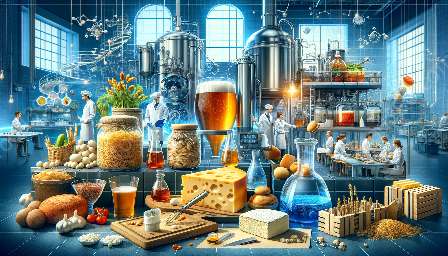Fermentation is a natural process that has been used for centuries to preserve, flavor, and transform food and drink. In the context of pickling and sauerkraut production, fermentation plays a crucial role in creating delicious and nutritious products. This topic cluster will delve into the science of fermentation and its application in the creation of pickled foods and sauerkraut, catering to both food and drink enthusiasts and fermentation science enthusiasts alike.
The Science Behind Fermentation
Fermentation is a metabolic process that converts carbohydrates, such as sugars and starches, into alcohol or organic acids using microorganisms like bacteria, yeast, or fungi. In the case of pickling and sauerkraut production, lactic acid fermentation is the key process. Lactic acid bacteria naturally present on the surface of fruits and vegetables or introduced through the environment consume the sugars in the food, producing lactic acid as a byproduct, which acts as a natural preservative.
Role of Microorganisms in Fermentation
Microorganisms play a pivotal role in the fermentation process. Lactic acid bacteria, particularly species of Lactobacillus, are the primary microorganisms involved in pickling and sauerkraut production. These bacteria thrive in an anaerobic environment, such as the brine used in pickling, and convert sugars into lactic acid, creating an acidic environment that inhibits the growth of spoilage microorganisms, thereby preserving the food. Understanding the role of microorganisms is crucial in ensuring the success of fermentation in pickling and sauerkraut production.
Pickling and Fermentation
Pickling is a method of food preservation that relies on the process of fermentation. The acidic environment created during fermentation prevents the growth of harmful bacteria, thus preserving the food. Commonly pickled foods include cucumbers, beets, carrots, and peppers. The flavors and textures of these foods undergo transformation during fermentation, resulting in tangy, crunchy, and flavorful pickled products.
Brine and Flavor Development
The brine used in pickling not only creates the anaerobic environment necessary for fermentation but also serves as a medium for flavor development. The combination of salt, water, and spices in the brine impacts the final flavor profile of the pickled product. Additionally, the fermentation process leads to the production of compounds that contribute to the characteristic tangy and savory flavors associated with pickled foods. Understanding the interplay between brine composition, fermentation, and flavor development is essential for producing high-quality pickled foods.
Sauerkraut and Fermentation
Sauerkraut, a popular fermented cabbage dish, is a prime example of how fermentation can elevate the flavor and nutritional profile of a food product. The lacto-fermentation of cabbage by lactic acid bacteria leads to the development of sauerkraut's distinctive sour flavor and crunchy texture. Additionally, the fermentation process enhances the bioavailability of certain nutrients, making sauerkraut a healthy and tasty addition to one's diet.
Fermentation Vessels and Conditions
The choice of fermentation vessel and the environmental conditions during sauerkraut fermentation significantly impact the final product. Factors such as temperature, salt concentration, and the exclusion of oxygen influence the growth and activity of lactic acid bacteria, thereby affecting the quality and safety of the sauerkraut. Understanding the role of fermentation vessels and environmental conditions is vital for consistent and successful sauerkraut production.
Fermentation Science and Food & Drink
Fermentation science encompasses the study of the intricate processes involved in the transformation of food and drink through microbial action. It intertwines with the realm of food and drink as it underpins the production of a wide array of fermented products, including pickles, sauerkraut, beer, wine, cheese, and more. Embracing the science of fermentation enhances our understanding of the foods and drinks we consume, allowing for greater appreciation of their flavors, textures, and nutritional value.
Impact of Fermentation Science
Understanding the principles of fermentation science empowers individuals to engage in informed decision-making regarding their food and drink choices. Whether it's selecting probiotic-rich fermented foods for gut health or appreciating the artistry behind craft beers and artisanal cheeses, fermentation science enriches the experience of food and drink consumption. Moreover, it opens up avenues for innovation, sustainability, and the creation of new and unique fermented products that cater to diverse palates.
By exploring the intersection of fermentation science, food & drink, and the captivating world of pickling and sauerkraut production, we gain insights into the age-old practice of fermentation, its modern relevance, and the multitude of delectable and healthful products it yields.

